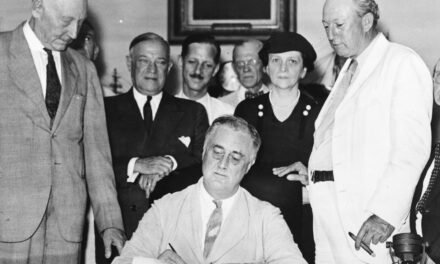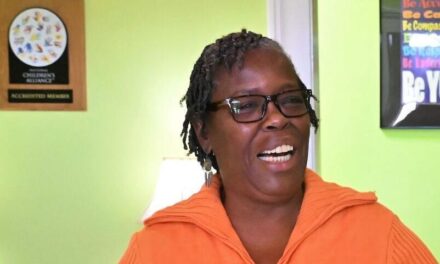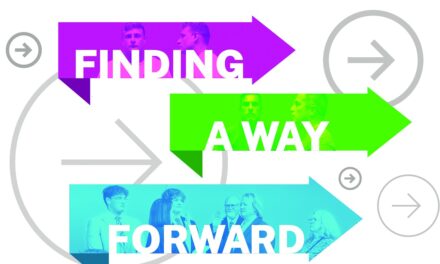
 US’ Simone Biles poses with the gold medal during the podium ceremony for the artistic gymnastics women’s team final during the Paris 2024 Olympic Games at the Bercy Arena in Paris, on July 30, 2024. (Photo by Lionel BONAVENTURE / AFP) (Photo by LIONEL BONAVENTURE/AFP via Getty Images)
US’ Simone Biles poses with the gold medal during the podium ceremony for the artistic gymnastics women’s team final during the Paris 2024 Olympic Games at the Bercy Arena in Paris, on July 30, 2024. (Photo by Lionel BONAVENTURE / AFP) (Photo by LIONEL BONAVENTURE/AFP via Getty Images)
Simone Biles came back with a vengeance.
The 27-year-old has officially become the most decorated U.S. gymnast in world championships history after earning three gold medals and one silver at the 2024 Olympics in Paris. But her incredible return to the sport is not just about her physical prowess. Biles’ comeback puts the resilience of Black athletes in overcoming significant mental health challenges back in the spotlight.
Biles is commonly called the GOAT because she is the greatest of all time. But the toll it takes to perform at an Olympic level is heavy and can quickly become dangerous. The question then becomes: would she still be the GOAT if she hadn’t prioritized her mental health? With the alarming rates of anxiety, depression, suicide, and opioid overdoses rising in the Black community, the need to prioritize mental health is even more pressing.
In the 2020 Tokyo Olympic games, which was held in summer 2021 due to the COVID-19 pandemic, Biles made headlines after withdrawing from the competition for a mental block, commonly called the twisties. Immediately after her Tokyo withdrawal, a firestorm of social media comments called her a quitter, lazy, and claimed she abandoned her team. Despite immense pressure to compete, Biles prioritized her mental health and safety.
The struggles she faced are detailed in the new Netflix docuseries, “Simone Biles Rising.” In the four-part series, which aired its first two episodes in July, Biles says she struggled with the twisties for years after her 2020 withdrawal. And she revealed how she dug deeper into the root of her mental health block.
 PARIS, FRANCE – JULY 30: Simone Biles of Team United States competes on the balance beam during the Artistic Gymnastics Women’s Team Final on day four of the Olympic Games Paris 2024 at Bercy Arena on July 30, 2024 in Paris, France. (Photo by Naomi Baker/Getty Images)
PARIS, FRANCE – JULY 30: Simone Biles of Team United States competes on the balance beam during the Artistic Gymnastics Women’s Team Final on day four of the Olympic Games Paris 2024 at Bercy Arena on July 30, 2024 in Paris, France. (Photo by Naomi Baker/Getty Images)
Kensa Gunter, a clinical and sport psychologist in Atlanta, says watching Biles set that boundary in 2021 was an example of the athlete saying yes to herself. Gunter recognizes that many people struggle with setting boundaries, in part, because most people don’t want to say no or disappoint others.
But she wants people to remember the importance of putting yourself first. In this case, Biles spent the last few years focused on her mental health to prepare for the Paris 2024 Olympics. Without that time off, it’s uncertain if Biles would have been able to recover and return to the sport she loves.
Getting mental health help “didn’t stop (Biles) from continuing her journey to cement her greatness, but that was a necessary part of her journey,” Gunter says. “Seeing and hearing athletes talk about their mental health … helps to demystify this notion that excellence doesn’t include managing adversity or challenges.”
During the years Biles spent working on her mental health, she also confronted the sexual abuse she experienced from Larry Nassar, the former USA Gymastics team doctor. Nasser sexually abused hundreds of gymnasts, including Biles, and was sentenced in 2018 to 40 to 175 years in prison for seven counts of sexual abuse.
Dozens of women, alongside Biles, testified before the Senate Judiciary Committe in 2021, a month after the Tokyo Olympics took place. It’s clear Biles had a lot on her mind. “I didn’t get the proper care before, because I just thought I was OK,” she said in the Netflix doc. She admits her mind and body were the first to catch up with her.
Not only was she reeling from the abuse she suffered from Nassar, the pandemic was still raging in 2021. The Tokyo games required strict COVID-19 measures and were held with no in-person audience. “I was immediately just thinking about the social isolation, the lack of emotional and social support,” Dr. Onnie Willis Rogers, professor of psychology and NCAA gymnastics champion said in the Netflix series.
In a series of surveys conducted by the Pew Research Center, 58% of young adults between the ages of 18 to 29 and 42% of Black women reported high levels of psychological distress between March 2020 to September 2022.
Seeing Biles come back not only was a validation and vindication for the athlete, to Gunter it was also a statement of the human spirit. And for so many other Black women, who are expected to uphold the strong Black woman stereotype, what Biles and other elite athletes have done is shift that narrative.
And Biles isn’t alone in speaking up.
Sha’Carri Richardson, a U.S. track and field athlete, was stripped of her qualifying Olympic team spot for the Tokyo games after testing positive for THC. Richardson was candid about her mental health struggles and coping skills following the death of her biological mother. And, Naomi Osaka, a tennis star, withdrew from the French Open also after revealing her struggles with depression and anxiety.
 Photo of Dr. Kensa Gunter. Courtesy of Gunter.
Photo of Dr. Kensa Gunter. Courtesy of Gunter.
“What I really think they did was force us to see their humanity, and not reduce them simply to an extraordinary performance,” Gunter says. “They are people first, people who are managing life, mental health … and they are working to be excellent at their craft.”
Three Black woman athletes Biles, Osaka, and Richardson, who are nothing less than great — all came toe-to-toe with their mental health in 2021. And for other Black athletes, seeing their comeback has been even more extraordinary.
Nicole Humphrey, 35, is the founder of Black Girls Shred, an organization she started to increase safety practices and develop safe spaces for Black and Brown youth skaters in Chicago. As a basketball and track and field athlete throughout high school and college, she says watching Biles take a step back was a defiant — and brave — move.
The Strong Black Woman stereotype is systemically endorsed as Black women who can overcome all obstacles, remain strong through any trial, and sacrifice themselves for others. The trope played out in its expectation of Biles to never quit, or immediately return to the center stage. “You’re supposed to just put your head down, suck it up, and do it,” Humphrey says.
But at what cost?
“Being a Black man, Black woman, going through life is so triggering,” she says. “When you get to a point of elevating and success … it’s very easy to fall into these oppressive systems and all the things that keep us on this treadmill of productivity. As Black people, that’s how we were introduced to this landscape of American society. If we continue to fold into that, we’re almost the oppressors to ourselves.”
In a white supremacist society, it’s easy to feel like there are so many things that put Black people at a disadvantage. In a system that wasn’t designed for Black Americans, Humphrey says it’s easy to fall into the trap of overworking yourself to the point where it becomes harmful to your mental health.
To see women like Biles, Richardson, and Osaka at the highest level of athletic success, go against the grain and say no is something that “is super affirming” for Humphrey. Existing in spaces where she has been the only Black woman, she reveres Biles and other Black athletes who are being authentically themselves despite the pressure to perform.
“These are different representations of Black women that are killing it, crushing it, and this through line of being human, young, and having fun, and being committed to their practice. Personally, for me, everything I’ve experienced in the last two years has been proof and a push to not give up,” Humphrey says.
She’s not alone in that sentiment.
Pro skater Christiana Smith, 27, is the founder of A Positive Seed, an organization focused on including more girls in skateboarding and mental health awareness. The Detroit athlete says she got into the sport when she was 11 and was oftentimes the only girl in those spaces. Smith describes the experience as isolating.
 Photo of Christiana Smith. Courtesy of Smith.
Photo of Christiana Smith. Courtesy of Smith.
“I dealt with depression. It can be hard when you’re in a mental health episode to enjoy doing things you love,” Smith says. “I remember the baby steps I took to overcome a mental health battle … I think being active helped me a lot, even just to step on my skateboard.”
As a Black woman, she says without prioritizing your mental health, everything else will falter. At the end of the day, “we’re all just human,” Smith says, and not getting proper mental health care can negatively affect Black women and girls.
“We owe it to ourselves and to our ancestors to not suffer and be very intentional about the ways we care for ourselves,” Humphreys says.
Despite the “demons” Biles faced, she’s won two gold medals so far in this “redemption tour” in Paris. She now has 11 Olympic and 30 world medals.
“It’s an incredible testament to who (athletes) are as people. It’s truly a profound statement about their humanity.” Gunter says. “It’s everything.”



